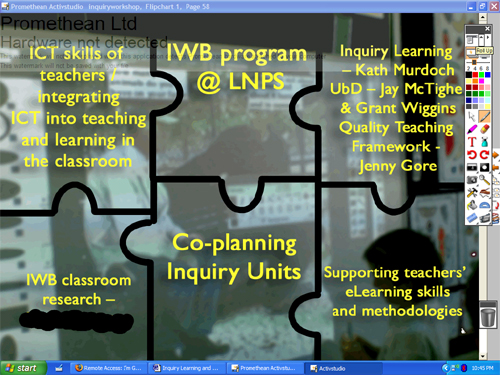After school, Wednesday, in our staff meeting time, I finally stepped up and talked about the idea of Sharing using digital tools for the first time. I mean it's not the first time I've talked about using Delicious or any other social media tool, but it is the first time I've couched the whole thing around the premise of sharing, and the possibilities that sharing with a wider network of educators than just the ones at your site might open up. I've shied away from really talking in a formal way to my colleagues about networked learning - a mixture of not wanting to push my own potential zealotry and a worry that most won't have a clue what I'm talking about anyway. It's hard to get the message just right so that they can see that this is a way that regular classroom teachers can go, because after all, it is the techhead, laptop loving freak pushing the ideas. If they could just sit here in this spot and see the potential stretch out in front of them like I can ...
I chose to show the first seven minutes of Dean Shareski's opening keynote video for the K12 Online Conference, which has stoked the fires of inquiring debate in a number of places across the web. I will chat to a few colleagues tomorrow and see what they got out of it. My worry is that not that they won't see value in this form of sharing, but that they will see it as something beyond them, beyond what time will allow for them, beyond what their capabilities are as an online navigator.
What I struggle with as well is this notion of self-directed learning as a professional. I believe that participation in networked learning is ideally suited for this - tools like Twitter are subverted for educational sharing. But Twitter is mainly about sharing stuff that other people have created or found, and Delicious is the same. Neither ask the participant to put themselves "out there" like writing a blog post or adding content to a wiki or even posting a reply to a forum. So, why is that so many teachers find the use of social media for sharing to be such a step that they are unwilling to take? I find it hard to imagine their reluctance and need to be shown because I (like the majority of edubloggers I assume) have learnt how to use and manipulate social media through active participation. Workshops and PD sessions on how to use Google Reader and Delicious seem to run counter to the whole point of self directed learning through technology.
Also I feel that for a practice to stick, to become habitual, the desire to explore further must come from within. Maybe some teachers will never grasp the concept of online networked learning for their own professional improvement ... but I have at least raised their awareness of what it is out there if they choose to look beyond their own self imposed boundaries.


 Inquiry Learning - Mark demonstrated how inquiry is broken into a developmental process appropriate to specific age levels. He gave an example of kindergartens using mobile phones to pixt images to their profile on the LMS, the parents then get a txt message to inform them that their child's profile has been updated. Interestingly, Mark's model does not have the students searching the internet as teachers handpick sites for student use, in order to build up critical literacy, teachers need to review pre-chosen resources.
Inquiry Learning - Mark demonstrated how inquiry is broken into a developmental process appropriate to specific age levels. He gave an example of kindergartens using mobile phones to pixt images to their profile on the LMS, the parents then get a txt message to inform them that their child's profile has been updated. Interestingly, Mark's model does not have the students searching the internet as teachers handpick sites for student use, in order to build up critical literacy, teachers need to review pre-chosen resources.
